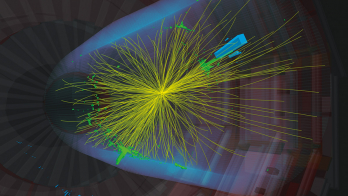
At the 22nd edition of the Planck conference series, which took place in Granada, Spain, from 3–7 June, 170 particle physicists and cosmologists discussed the latest in beyond the Standard Model (BSM) physics and ultraviolet completions of the SM within theories that unify the fundamental interactions.
Several speakers addressed the serious model-building restrictions in supersymmetry and Higgs compositeness that are imposed by the negative results of direct searches for BSM particles at ATLAS and CMS. Particular emphasis was put on the (extended) Higgs sector of the SM, where precision measurements might detect signals of BSM physics. Updates from LHCb and Belle on the flavour anomalies were also eagerly discussed, with proposed explanations including leptoquarks and additional U(1) gauge symmetries with exotic vector-like quarks. However, not all were convinced that the results signal BSM physics. On the cosmological side, delegates learned of the latest attempts to build models of WIMPs, axions, magnetic relics and dark radiation, which also include mechanisms for baryogenesis and inflation in the early universe.
Given the absence of new BSM particles so far at the LHC, theorists talk of a “desert” beyond the weak and Planck scales containing nothing but SM particles. Several speakers reported that phase transitions between non-trivial Higgs vacua could lead to violent phenomena in the early universe that might be tested by future gravitational-wave detectors. Within the inflationary universe these phenomena might also lead to the production of primordial black holes that could explain dark matter.
Discussions of ultraviolet (i.e. high-energy) completions of the SM encompassed the grand unification of fundamental interactions, the origin of neutrino masses, flavour symmetries and the so-called “swampland conjectures”, which characterise theories that might not be compatible with a consistent theory of quantum gravity. Therefore, one might hope that healthy signals of BSM physics might appear somewhere between the desert and the swampland.
Planck 2020 will be held from 8-12 June in Durham, UK.







